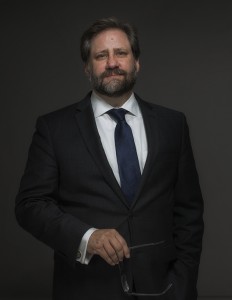‘Excellence That We Recognize’: What The NEH Funds In Texas
ArtandSeek.net February 22, 2019 51The Chairman of the National Endowment for the Humanties, Jon Parrish Peede, has been touring North Texas this week. For our State of the Arts conversation, KERA’s Jerome Weeks asked him how the NEH influences, funds, even inspires university and museum programs in our region.
As a term, “humanities” is both broad and somewhat scholarly-seeming. People know the National Endowment for the Arts, your sister agency, because they have some experience with the arts. But the … ‘humanities’? You’re undoubtedly asked this all the time, but do you have a quick, nutshell definition of what the National Endowment for the Humanities funds?
During your visit here for three days, representatives from our major art museums and university programs have been meeting with you. I realize, hey, you represent grant money. But how much sway or influence does the NEH actually have?

Jon Parrish Peede. Photo: NEH
While you’ve been here, you gave a speech at Texas Christian University, and in that speech you said, ‘For those of you in universities, you must make every effort to have an impact beyond the academy and into our larger communities among our fellow Americans.” Basically, to get out of the ivory tower. Can you cite instances of NEH funding such efforts?”
But also, we have a number of organizations that we’ve funded. For example, the Dallas County Historical Foundation we funded, and again that was for oral history, also digital activities. And the Dallas Institute of Humanities and Culture had a $10,000 grant from us to have an educational forum. Another example of the way the NEH funds local institutions – again getting us beyond the walls of the university – is the Sixth Floor of Museum.
I think a community that has a versatile economy, by its very definition, has strong historical museums, historical centers, libraries, places where we can meet, can convene, and discuss the humanities and the issues that matter to us.
Speaking of convening together, you also said that “humanities are not a luxury, are not frivolous, are not divisive. Rather, humanities are what bind us together in our common journey.” It made me wonder, Hmmm. Has this guy ever been in a departmental meeting arguing the relative merits of Philip Roth versus Zadie Smith?
“I think what the humanities do is bind us together by saying ‘This is what matters.’”
You spoke of cultural amnesia. I often think of it as a kind of Alzheimer’s. As a person loses his memory, he actually loses his sense of self, of who he was. If he’s forgotten that giant trauma, that he fought in a war, he ceases to be the same person. The same thing is true, of nations, of cultures, if they no longer remember that giant, history-defining trauma – the Great Depression, the Holocaust – it changes the nature of who we are.
If we don’t understand what this nation is trying to be at its establishment, then we’re not going to understand how Frederick Douglas clarified it. We’re not going to understand the Nineteenth Amendment, women’s right to vote – which the NEH is funding a PBS documentary on. And we’re not going to understand how the Nineteenth Amendment matches up with Martin Luther King’s movement, and the NEH has also funded for decades the Martin Luther King papers.
So the Humanities Endowment, as an organization, we’re trying to make sure we touch on these moments. And I’ll say this, as the federal government looks to how we’ll recognize – in the year 2026 – the 250th anniversary of the founding of this nation, the endowment is really taking a leading role in saying ‘Let’s talk about that history.’ By the way, let’s make sure we include everyone. When I talk about American history, it’s a very inclusive idea of what America is.
You’ve been the head of the NEH for 18 months now. So, I have to ask, what has it been like running the agency under President Trump, who appointed you and who has twice tried to zero out the agency in his budgets.
So, yes, the President has made that budget recommendation, and I’m the person who officially submits that to Congress. And then Congress looked at it, and when the House and the Senate were both Republican [majorities], they actually said, “We want to keep the agency.” And increase the budget. Now, we have the House under the Democrats and the the Senate under the Republicans, and they actually said “We want to raise the budget.’
So my responsibility is, once the President signs it into law, to make sure I’m being a good steward of those tax dollars. And one thing I can say about my interactions with the White House, which are frequent, is that no one is speaking in a negative way about the arts, about the humanities, about culture. There may be individuals who might not see it as a funding priority, but that’s not the same, for example, as the “culture wars” or these kinds of things.
So, I have actually found it quite comfortable to go across the country as I do, and talk about the value of humanities. And I don’t, of course, advocate for budget or any piece of legislation, which I’m not allowed to do, by law.
But I am unapologetically excited about the humanities and the arts, and I think the message I would drive home to applicants and everyday citizens, is that this agency is enthusiastic. It’s not sitting back, kind of waiting for some kind of final decision. But, rather, we’re going across the country, we’re investing in communities with great enthusiasm.










